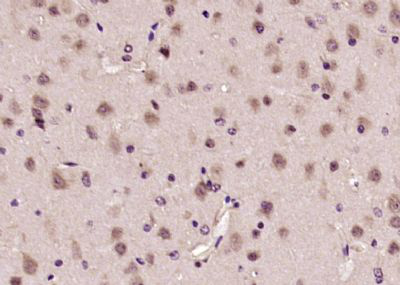产品货号 : mlR13481
英文名称 : GOLGA5
中文名称 : 高尔基体膜相关蛋白5抗体
别 名 : Cell proliferation inducing gene 31; Cell proliferation-inducing gene 31 protein; GOGA5_HUMAN; GOLGA 5; GOLGA5; Golgi autoantigen golgin subfamily a 5; Golgi integral membrane protein 5; Golgin 84; Golgin subfamily A member 5; Golgin-84; Golgin84; GOLIM 5; GOLIM5; Protein Ret-II; PTC5; Ret fused gene 5; RET fused gene 5 protein; Ret II; Ret II protein; RET-fused gene 5 protein; RFG 5; RFG5.
研究领域 : 肿瘤 细胞类型标志物 细胞膜蛋白
抗体来源 : Rabbit
克隆类型 : Polyclonal
交叉反应 : Human, Mouse, Rat, Pig, Cow, Horse, Rabbit,
产品应用 : WB=1:500-2000 ELISA=1:500-1000 IHC-P=1:400-800 IHC-F=1:400-800 ICC=1:100-500 IF=1:100-500 (石蜡切片需做抗原修复)
not yet tested in other applications.
optimal dilutions/concentrations should be determined by the end user.
分 子 量 : 83kDa
细胞定位 : 细胞浆 细胞膜
性 状 : Lyophilized or Liquid
浓 度 : 1mg/ml
免 疫 原 : KLH conjugated synthetic peptide derived from human GOLGA5:401-500/731
亚 型 : IgG
纯化方法 : affinity purified by Protein A
储 存 液 : 0.01M TBS(pH7.4) with 1% BSA, 0.03% Proclin300 and 50% Glycerol.
保存条件 : Store at -20 °C for one year. Avoid repeated freeze/thaw cycles. The lyophilized antibody is stable at room temperature for at least one month and for greater than a year when kept at -20°C. When reconstituted in sterile pH 7.4 0.01M PBS or diluent of antibody the antibody is stable for at least two weeks at 2-4 °C.
PubMed : PubMed
产品介绍 : The Golgi apparatus, which participates in glycosylation and transport of proteins and lipids in the secretory pathway, consists of a series of stacked cisternae (flattened membrane sacs). Interactions between the Golgi and microtubules are thought to be important for the reorganization of the Golgi after it fragments during mitosis. This gene encodes one of the golgins, a family of proteins localized to the Golgi. This protein is a coiled-coil membrane protein that has been postulated to play a role in vesicle tethering and docking. Translocations involving this gene and the ret proto-oncogene have been found in tumor tissues; the chimeric sequences have been designated RET-II and PTC5. [provided by RefSeq, Feb 2010].
Function:
Involved in maintaining Golgi structure. Stimulates the formation of Golgi stacks and ribbons. Involved in intra-Golgi retrograde transport.
Subunit:
Homodimer. Interacts with RAB1A that has been activated by GTP-binding, and possibly also with OCRL1. Interacts with isoform CASP of CUX1.
Subcellular Location:
Golgi apparatus membrane. Found throughout the Golgi, both on cisternae and, at higher abundance, on the tubulo-vesicular structures of the cis-Golgi network.
Tissue Specificity:
Ubiquitous. Highly expressed in seminiferous tubules and Leydig cells in testis, and detected at much lower levels in the other tissues tested. Expression is very low or not detectable in spermatozoa.
Post-translational modifications:
Highly phosphorylated during mitosis. Phosphorylation is barely detectable during interphase.
DISEASE:
Defects in GOLGA5 are a cause of thyroid papillary carcinoma (TPC) [MIM:188550]. TPC is a common tumor of the thyroid that typically arises as an irregular, solid or cystic mass from otherwise normal thyroid tissue. Papillary carcinomas are malignant neoplasm characterized by the formation of numerous, irregular, finger-like projections of fibrous stroma that is covered with a surface layer of neoplastic epithelial cells. Note=A chromosomal aberration involving GOLGA5 is found in thyroid papillary carcinomas. Translocation t(10;14)(q11;q32) with RET. The translocation generates the RET/GOLGA5 (PTC5) oncogene which was found in 2 cases of PACT in children exposed to radioactive fallout after Chernobyl.
SWISS:
Q8TBA6
Gene ID:
9950
Important Note:
This product as supplied is intended for research use only, not for use in human, therapeutic or diagnostic applications.
产品图片












